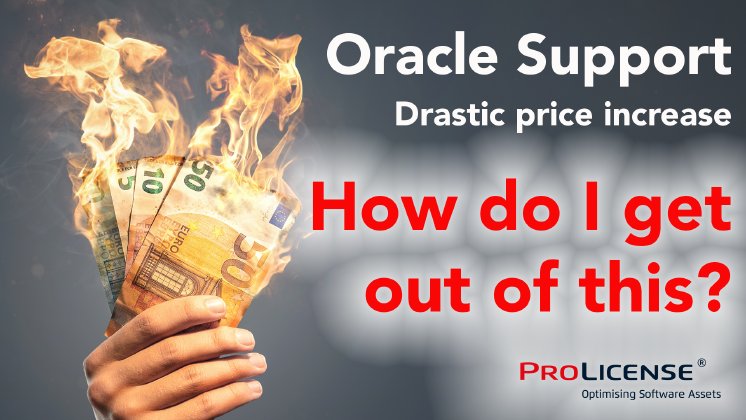It is currently unclear whether this is a one-off price jump, or whether the new percentages will apply permanently and the fees for Oracle support will rise accordingly on a permanent basis. The previous annual increase was typically 4%. It is hoped that next year will see a return to the old rate of price increase. However, since Oracle justifies the price increase for Oracle Support with the inflation rate, it would be more likely that increased percentages would be applied in subsequent years until inflation comes down again. This may take some time. Oracle will certainly also use the price increases for Oracle Support as part of their negotiations to drive customers to another solution: The Oracle Cloud. But again, nothing is certain. SAP has just introduced a fixed cloud fee increase rate of 3.3%.
Is there a way out?
To escape these Oracle support price increases in the future, there are three options:
1. leave Oracle
There has been a trend for some time for customers to leave Oracle and migrate to cloud models or use open source products, such as PostgreSQL. However, this is not an option that can be rolled out overnight. A wholesale shift away from Oracle products takes 2-3 years during which Oracle will not reduce charges, even when usage is significantly reduced. For some business, and business processes, it is simply not a viable option to move away from Oracle. The pain of the price increase is less than the pain of moving products.
2. negotiate Oracle support
Customers can try to negotiate support with Oracle. Usually the negotiation is not particularly successful. Customers that avoid the 4% price increase (for one year) often think they have been ‘successful’ in the negotiation.
3. Oracle third party support
The only ‘immediate’ option is to cancel Oracle support and switch to Oracle third-party support models. Gartner has stated that this market has developed rapidly and nowadays some providers offer a more comprehensive and complete service than the manufacturer itself. As an example, concerns over the lack of OEM patches are addressed and lack of Oracle patches is no longer a reason to remain with Oracle.
The Oracle specialists at ProLicense have been independently advising clients on licensing and support issues since 2009. "We help our clients negotiate the cost of Oracle support," says Christian Grave, Oracle licensing expert and managing director at ProLicense. "We provide many more arguments and discussion points than an in-house team would, using our more than 20 years of Oracle experience working with many of Germany’s largest corporations" adds Sören Reimers, lawyer and expert in Oracle used software, among other things. With the right negotiation strategy, it is possible to put Oracle under pressure here and negotiate price reductions.
"However, customers should definitely consider Oracle third-party support", says Markus Oberg, expert for Oracle third-party support at ProLicense. "You have to understand exactly how these models work and then you quickly realise that switching is a real alternative that many organisations have used to liberate their ERP strategy, improve services on Oracle and gain from immediate cost savings. Missing Oracle patches is no longer an issue these days. Third-party providers can also solve security & vulnerability problems - just in a different way," Oberg continues. It is also possible to use Oracle third-party support only for parts of the Oracle licences, if you use the concepts correctly. ProLicense has outstanding expertise in this area.
"Many customers think that they cannot leave Oracle support because then they cannot change to newer versions in later years," says Reimers. It is correct that customers lose their right to newer versions, but the Oracle experts at ProLicense know a way out of this too - at least for European companies. "That's what the market for Oracle used software is for these days," Reimers clarifies. ProLicense Xchange is the leading broker of Oracle used software in Europe. But companies outside Europe can also use this way out if they have a subsidiary in Europe and procure licences with worldwide right of use in Europe.
The Oracle specialists explain the different possibilities to customers in a free initial consultation and show ways out of the Oracle cost trap. Customers can obtain independent information and arrange a meeting via the ProLicense website:
Contact ProLicense
Interesting YouTube videos:
ORACLE used software - How do I buy ORACLE pre-owned software?
Do you use ORACLE 3rd party support and need upgrades?


